Little Gems
One of the recurrent topics at cons is whether e‑publishing will impact on the publication of shorter fiction. Thus far: not so much insofar as I've seen. Although it is now quite possible to, say, sell a single short story as an e‑book(let?) on Amazon, nobody seems to be saying this is a big thing and a way for a writer to pay the bills (please correct me in comments if I'm wrong!). However, there is the matter of the novella. Previously novellas were a rarified enough thing that I only really had them flagged up as a thing when looking at award categories. This is mostly because the length of an epic fantasy novel tends towards the "2 entire novels of any other genre" rather than to brevity. A novella runs from 17,500–40,000 words according to the Hugo criteria, because back in the palaeozoic there were full-on fantasy and SF novels clocking in at 40,001 (between this and the 7,500 word short story is, of course, the moist novelette). I get the impression that historically novellas have been tricky things to market — a very slim volume on the shelves, or possibly gathering for safety in numbers with other novellas (like the two I've done for Abaddon, in Journal of the Plague Year and Monstrous Little Voices.)
Of course an e‑book doesn't care as much how long it is, and though the short story revolution some people predicted hasn't kicked off yet, there does appear to be an armed novella uprising. Specifically, I'm seeing more submission calls for novellas, and last year Tor.com kicked off their own novella line which I thought I'd give a look at. I've managed to grab up a half dozen and, as I don't e‑read, I got to see just what you received if you ordered a print copy. The answer being, a very nice little volume indeed that sits on the shelf without being overwhelmed and with top notch cover art (see the images I'll hopefully remember to garland this post with).
What's fascinating is seeing how the authors — most of whom, at least, I know from longer work — approach their shortened circumstances, because it's plain that there's more than one way to skin a cat down to 30,000 words.
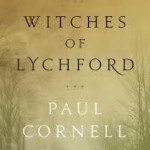 Paul Cornell gives us The Witches of Lychford, a story about supernatural intrusion into a little English village of the modern day — incorporating the takes of the new local vicar, the atheist magic shop owner and a local witch on a menace from outside in more ways than one. It's a lovely tale, very neatly told, and left very open for the next go-round with the characters (which I believe is indeed on the way) — so that it plays like the first episode of a serial, say. The style recalls Cornell's excellent Shadow Police books, but the very different setting and less "professional" characters give it a new spin. (As I write this one is on the short fiction shortlist for the BSFA awards).
Paul Cornell gives us The Witches of Lychford, a story about supernatural intrusion into a little English village of the modern day — incorporating the takes of the new local vicar, the atheist magic shop owner and a local witch on a menace from outside in more ways than one. It's a lovely tale, very neatly told, and left very open for the next go-round with the characters (which I believe is indeed on the way) — so that it plays like the first episode of a serial, say. The style recalls Cornell's excellent Shadow Police books, but the very different setting and less "professional" characters give it a new spin. (As I write this one is on the short fiction shortlist for the BSFA awards).
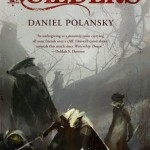 In contrast, Daniel Polansky's The Builders is unrepentantly the last act of a story told in piecemeal recollection as we're introduced to the cast, who are pretty much on their way to a final confrontation with an old enemy. Polansky writes the grittiest of the grimdarks, and this is certainly just as dirty-nailed and dark-humoured as his Low Town books. There is an additional level of joy with the characters being anthropomorphic animals, so that it plays out as though the cast of Wind in the Willows were in a dystopic Western (or 'Rango Unchained' maybe?). The species choices for the characters add a whole extra dimension.
In contrast, Daniel Polansky's The Builders is unrepentantly the last act of a story told in piecemeal recollection as we're introduced to the cast, who are pretty much on their way to a final confrontation with an old enemy. Polansky writes the grittiest of the grimdarks, and this is certainly just as dirty-nailed and dark-humoured as his Low Town books. There is an additional level of joy with the characters being anthropomorphic animals, so that it plays out as though the cast of Wind in the Willows were in a dystopic Western (or 'Rango Unchained' maybe?). The species choices for the characters add a whole extra dimension.
 Nnedi Okorafor's Binti is a beautiful piece of SF, with the titular character the first to leave her insular people on earth and go to a multispecies university — against the wishes of her family and bringing along a whole set of traditions that mark her out as 'other' amongst the other humans. However, everything changes when the ship is attacked by hostile aliens intent, it seems, on wiping out everyone on board. Binti fits the novella length by a keen focus on the title character, resourceful, intelligent, frightened and very, very human. As with Lagoon's Nigeria, Binti, one of the Himba people of Namibia, brings a whole new perspective on (and solutions to) SF tropes and situations. (And this has also been shortlisted for the BSFA this year, and apologies for overlooking it first time round.)
Nnedi Okorafor's Binti is a beautiful piece of SF, with the titular character the first to leave her insular people on earth and go to a multispecies university — against the wishes of her family and bringing along a whole set of traditions that mark her out as 'other' amongst the other humans. However, everything changes when the ship is attacked by hostile aliens intent, it seems, on wiping out everyone on board. Binti fits the novella length by a keen focus on the title character, resourceful, intelligent, frightened and very, very human. As with Lagoon's Nigeria, Binti, one of the Himba people of Namibia, brings a whole new perspective on (and solutions to) SF tropes and situations. (And this has also been shortlisted for the BSFA this year, and apologies for overlooking it first time round.)
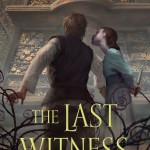 KJ Parker's novella is The Last Witness, and any fan of his will find it a perfect Parker tale in miniature — the same moral complexity, the same easy voice, the same sudden vertiginous twists. It's a powerful little tale, and one dealing with some more up-front out of the ordinary elements than Parker generally does (they are there in his work, but often buried deep, or of debatable effect, or just a shock revelation late on — whereas here they are the point of the story).
KJ Parker's novella is The Last Witness, and any fan of his will find it a perfect Parker tale in miniature — the same moral complexity, the same easy voice, the same sudden vertiginous twists. It's a powerful little tale, and one dealing with some more up-front out of the ordinary elements than Parker generally does (they are there in his work, but often buried deep, or of debatable effect, or just a shock revelation late on — whereas here they are the point of the story).
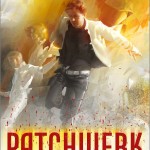 Another approach to the shortened narrative, and a very effective one, is David Tallerman's Patchwerk, which brings us in in medias res and basically doesn't stop running throughout the book, in a desperate chase from start to finish as the lead character tries to undo the terrible result of his own scientific genius. I've enjoyed Tallerman's writing before (His …Thief series is superior fantasy) and this is him showing just how versatile he can be. For reasons I can't go into (because spoilers) there is a huge amount of variety packed into this little book, and it doesn't flag for a moment. It's based around a fascinating concept that, again, I can't tell you, but highly recommended.*
Another approach to the shortened narrative, and a very effective one, is David Tallerman's Patchwerk, which brings us in in medias res and basically doesn't stop running throughout the book, in a desperate chase from start to finish as the lead character tries to undo the terrible result of his own scientific genius. I've enjoyed Tallerman's writing before (His …Thief series is superior fantasy) and this is him showing just how versatile he can be. For reasons I can't go into (because spoilers) there is a huge amount of variety packed into this little book, and it doesn't flag for a moment. It's based around a fascinating concept that, again, I can't tell you, but highly recommended.*
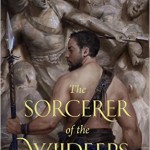 Finally, we have the only one I've read by an author I've not come across before, Kai Ashante Wilson's The Sorcerer of the Wildeeps. This one is compared to Gene Wolfe on the cover, which by my book is a damn high bar, but Wilson clears it readily. Here, rather than the first or last section, the book reads like a comfortable, richly-detailed second act, with the preceding events told sparingly in flashback, and leaving me definitely wanting to know what might happen next. There is a whole lot of worldbuilding packed in, and the world is fascinating and definitely redolent of the New Sun setting, but at the same time the characters are all brought deftly alive — from the titular sorcerer down to the least caravan guard — , the dialogue is a fascinating example of how to use modern idiom in a fantasy setting and make it work, and the prose style is poetic and elegant and a real joy to read.
Finally, we have the only one I've read by an author I've not come across before, Kai Ashante Wilson's The Sorcerer of the Wildeeps. This one is compared to Gene Wolfe on the cover, which by my book is a damn high bar, but Wilson clears it readily. Here, rather than the first or last section, the book reads like a comfortable, richly-detailed second act, with the preceding events told sparingly in flashback, and leaving me definitely wanting to know what might happen next. There is a whole lot of worldbuilding packed in, and the world is fascinating and definitely redolent of the New Sun setting, but at the same time the characters are all brought deftly alive — from the titular sorcerer down to the least caravan guard — , the dialogue is a fascinating example of how to use modern idiom in a fantasy setting and make it work, and the prose style is poetic and elegant and a real joy to read.
There are more out there I intend to track down, and I am particularly looking forward to Every Heart a Doorway from Seanan McGuire, a story about a school for children who have returned from adventures in other worlds. So far, though, I've enjoyed every one I've tried.
*I'm not just saying this because I get a mention in the dedication.
 © 2008-2025 Pan Macmillan
© 2008-2025 Pan Macmillan
I'm also enjoying this resurgence of novellas. Patchwerk was a great action adventure story crammed full of setting ideas, and the sci-fi novella Voids by Tim Jeffreys and Martin Greaves packs one heck of an emotional punch. It's great to see authors getting to play with works of different lengths.
On short stories, I've not heard of anyone making much money off publishing individual shorts, though David Gaughran has had some success bundling a few together. A lot of independent authors use them as a marketing tool instead, putting out a free e‑book short that leads readers into their other books. Anecdotally, I've heard that it works, and it's brought me a few readers, though I don't know how effective it is compared with anything else you could do with the time and story.